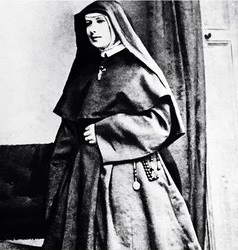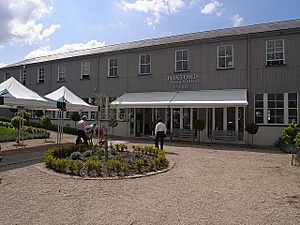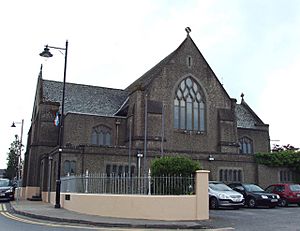Agnes Bernard facts for kids
Quick facts for kids
Agnes Morrogh Bernard
|
|
|---|---|

Mother Mary Joseph Arsenius
|
|
| Born | 24 February 1842 Cheltenham, England
|
| Died | 20 April 1932 (aged 90) Foxford, Ireland
|
| Employer | Religious Sisters of Charity |
| Known for | Foxford convent and mills |
Agnes Morrogh Bernard, also known as Sister Mary Joseph Arsenius, was a Roman Catholic nun. She is remembered for starting two convents and a special woollen mill in Foxford, Ireland. She was born on February 24, 1842, and passed away on April 20, 1932.
Early Life and Becoming a Nun
Agnes Morrogh Bernard was born in Cheltenham, England, in 1842. Her parents were John and Frances Mary Morrogh. In 1849, her family inherited land in County Kerry, Ireland. Because of this, they changed their last name to Bernard.
The family moved to Shehersee House on their new estate. In 1854, Agnes started her formal education at Laurel Hill convent in Limerick. After three years there, she spent a year with her parents. Then, she went to Paris to finish her studies at the Convent of Dames Anglaises. It was there that she decided to dedicate her life to religion.
At 21, she became a novice at the Religious Sisters of Charity convent in Dublin. In 1863, she took the name Sister Mary Joseph Arsenius. She made her final promises as a nun in 1866. At first, she taught, but later she moved into managing and organizing.
In 1877, a new convent opened in Ballaghaderreen in County Mayo. Sister Bernard was chosen to be the Reverend Mother there. The convent grew even more in 1879, adding a national school. By 1866, it also included an industrial school, which helped teach useful skills.
Helping Foxford Grow
Sister Bernard left Ballaghaderreen and arrived in Foxford on December 9, 1890. She opened another convent in 1891 and took over a national school in the town. Foxford was a very poor area, and Sister Bernard wanted to help the people there.
She managed to get £7,000 in funding. With this money, she opened the Providence Woollen Mill in Foxford in 1892. The mill used power from the nearby River Moy. Sister Bernard was known for her modern and fair approach. This helped her get support from skilled people, even those from different religious backgrounds.
Sister Bernard's good management and the success of the mill attracted more funding. The Mill started training its own workers. Over time, it also offered training in other skills useful for the local area. Sister Bernard's organization also taught new ways of raising poultry, farming, and gardening. In 1897, she even started a Brass and Reed Band, which was still playing in 2014.
Sister Bernard usually tried to stay out of politics. However, she did get involved when there were disagreements between her workers and the local priest. She also stepped in when some of her workers were treated unfairly by soldiers in 1921. Sister Bernard was able to make sure the soldiers were disciplined for their actions.
She also supported the revival of Irish culture and language. She had already arranged for cottages to be built for workers. She personally organized roads to give access to 118 houses. In 1898, she oversaw the building of cart roads to 118 homes. She also encouraged local leaders to build more homes for workers. Sister Bernard was very interested in the social and cultural life of the area. She supported groups working to bring back the Irish language and traditions.
Sister Bernard passed away at her convent on April 20, 1932. She was buried there three days later.
Legacy
The Foxford Woollen Mills are still in business today. They trace their beginnings back to the hard work and vision of Sister Mary Joseph Arsenius.



